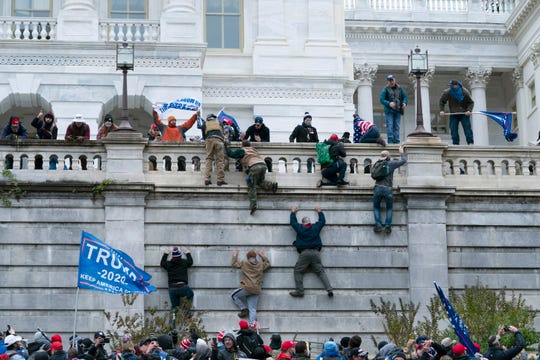Republican lies have thrust America into its third revolution. We are a nation in crisis.

Angry supporters of President Donald Trump scale the west wall of the the U.S. Capitol in Washington on Jan. 6, 2021. (Photo: Jose Luis Magana, AP)
To read and listen to the headlines after House Republicans voted to remove Rep. Liz Cheney from her leadership post, one would think that the “turning point” in the Republican Party began with its denial of the 2020 election result after Nov. 3, or the Capitol insurrection on Jan. 6. Neither of those moments, however, is or was the actual turning point. Instead, the transformation one of the nation’s two major political parties took place well before each of those events. And the longer it takes for the public conversation to recognize how dramatically the Republican Party has already shifted, the longer it will take to develop a coherent civic strategy to protect U.S. democracy going forward.
And we do need a strategy, because this political crisis is not just the internal machinations of a single political party; it is a political crisis of a nation. Indeed, it might not be hyperbolic to characterize our present national state as in the midst of the third revolution.
Tectonic shift in the Republican Party
What was at first an acquiescence to Donald Trump since his nomination at the Republican National Convention in 2016 slowly became a public acceptance, and then an entanglement. Some who were slow to realize the tectonic shift taking place in the Republican Party over the past five years have awakened from their slumber in the wake of the attack on the Capitol. They are a little late. Those who thought they could wait out Trump’s presidential term before getting on the right side of history were wrong; the time for choosing in a way to actually affect the trajectory of the modern-day Republican Party was earlier.
One explanation for this delayed acknowledgement could be that even sophisticated political participants forget how quickly political parties can completely transform or disappear. Some political actors perhaps thought that they had more time. In the 1850s, a decade before the Civil War, the relative balance that had lasted for a generation between the two political parties – the Democrats and the Whigs – collapsed. The Whig Party disintegrated between 1852 and 1856. As this historic transformation shows, fundamental change to a political party need not take decades. It can happen in just a few years.
From left, Jared Kushner, Ivanka Trump, President Donald Trump and Japanese Prime Minister Shinzo Abe in Osaka in 2019. (Photo: Brendan Smialowski/AFP/Getty Images)
From 2016-20, it appeared that the Republican Party might disintegrate like the Whigs. First, the GOP looked away as Trump relied on family members instead of government professionals as White House advisers. Second, midway through his term, the president fired or solicited the resignations of political appointees of his own party who had been confirmed by the Senate. He repeatedly turned on his own appointees, particularly when they sought to carry out their lawful functions. Third, the Republican convention in 2020 declined to adopt a political platform; instead, it allowed the party to reflect the whims of its highly personalized leader.
Donna Brazile: Liz Cheney’s ouster should alarm all fact-based Americans who believe in our country
Since then, the vast majority of Republican voters and officials have embraceddenial of the 2020 election result and refused to acknowledge the severity of the Jan. 6 attack on the Capitol. These developments reveal that the Republican Party will not give up like the Whigs. The party will persevere, emboldened by taking pride in belligerence and transformed into a political movement that embraces fraud and deceit as fundamental to its survival and electoral success.
US democracy’s existential crisis
We are all familiar with the first American Revolution: an actual war, a rebellion for self-governance. But it was not long after that Thomas Jefferson called the election of 1800 the “second American revolution.” The election of the Democratic-Republicans over the Federalists set the course for the nation in Jefferson’s vision of American democracy, and permanently marginalized the Federalist Party and led to its ultimate replacement by the Whigs.
In the hours after the insurrection at the U.S. Capitol, former president Trump tweeted, “Remember this day forever!” Participants in the melee he incited openly invoked 1776.
American Revolution reenactment in Lexington, Mass., in 2006. (Photo: JOSH REYNOLDS, AP)
We will not know until after the 2022 midterms and the 2024 presidential election whether the result of 2020 set the nation on a path toward Democratic Party domination for a generation, like the election of 1800. But we think this moment in our nation’s history is best understood as the third American revolution – hopefully primarily of competing ideas and minimally of political violence – where the effective functioning of American elections and democratic institutions hangs in the balance.
Leaving no doubts: Liz Cheney removal makes it official. Republicans pick Trump over truth and Constitution.
It is no longer enough to characterize the present political crisis as an internal party dispute. Instead, we are witness to a political revolution that will define American society and governance for decades to come.
Carrie Cordero (@carriecordero) is the Robert M. Gates Senior Fellow at the Center for a New American Security and adjunct professor at Georgetown Law. Edward J. Larson is a Pulitzer Prize winning legal historian and a professor at Pepperdine University whose latest book is “Franklin & Washington: The Founding Partnership.”
You can read diverse opinions from our Board of Contributors and other writers on the Opinion front page, on Twitter @usatodayopinion and in our daily Opinion newsletter. To respond to a column, submit a comment to [email protected].
Source: Read Full Article

